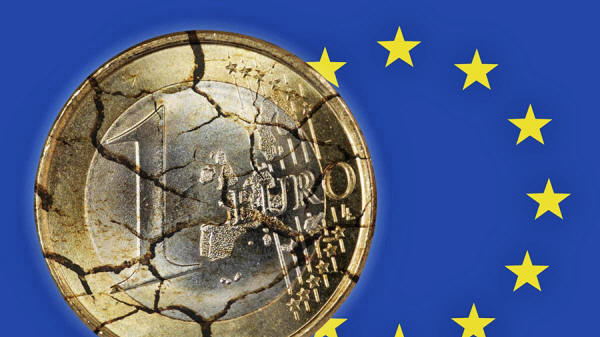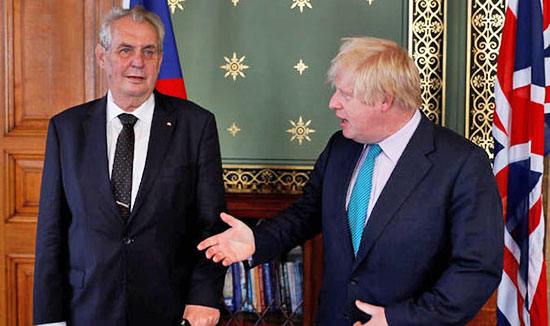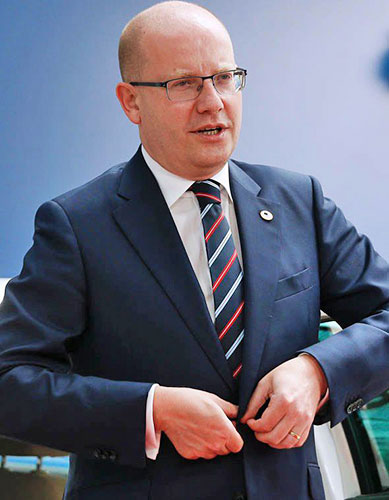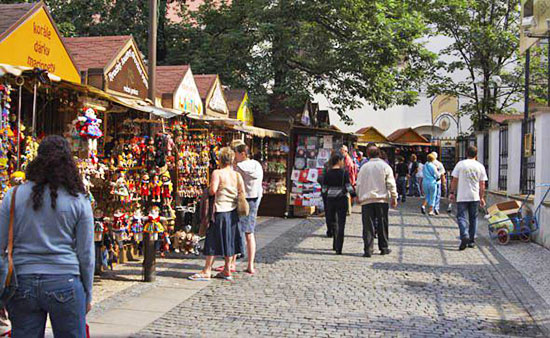|

by Jon Rogers
June 23,
2017
from
Express Website

The Czech people have rejected
joining the struggling Euro
with even the country's
president recognizing
that the people do not want
to adopt the currency.
While financial experts say they country could sign up as the
general conditions are right, leader Milos Zeman has said
that the people are against the move.
He said:
"We have been
fulfilling the Maastricht criteria, but there is a mental
barrier to its adoption. A mere 30 per cent of Czechs are in
favor of entering the eurozone."
The governor of the Czech
Republic's central bank, Jiri Rusnok, has also said that the
country is ready to adopt but added that it might be better to wait
until wages and prices approached those of the bloc's core members

Czech Republic's Milos Zeman
with Boris Johnson (R)
Getty
According to Mr Rusnok, the Czech Republic is ready to give up the
koruna but many believe it will not happen for at least five to 10
years.
He added while wage rises in some of the leading European economies
are almost zero, the average salary increase in the Czech Republic
is currently around five per cent.
Currently the nominal rate of wages rises in the country was 5.3 per
cent in the first half of the year with average wages equivalent to
€10 an hour.
Why these nations could
leave the Eurozone
Heavily
indebted Greece has no acute shortage of money,
but will need
money again from the ongoing aid program this summer.
But Athens is
not the only shaky candidate of the Eurozone.
These are the
other countries causing worries

Across the European Union countries though the figure is around €25
with this rising to €30 in some eurozone countries.
Czech Prime Minister Bohuslav Sobotka said:
"For us to remain at
the core of the European Union, sooner or later we will have to
respond to the question of not whether, but when the Czech
Republic is capable of adopting the single European currency."
The move comes after the
latest economic data indicates while the eurozone countries are
showing some signs of life they are continuing to struggle.

Czech Prime Minister
Bohuslav Sobotka
IHS Markit's latest monthly health check across the countries have
indicated, while the private sector has recorded signs of
improvement, the rate of growth has slowed.
A statement from the company said:
"Although the rate of
growth waned to a five-month low, high order book inflows and
elevated levels of business confidence meant job creation
remained one of the strongest recorded over the past decade as
firms continued to expand capacity to meet rising demand.
"Price pressures
eased, however, largely reflecting lower global commodity
prices."

Shoppers on the streets of
the
Czech capital Prague
JP Morgan took a more positive approach to the eurozone stating:
"The macroeconomic
momentum appears to have eased somewhat in June, in particular
in the Services sector.
"In light of the
sharp improvement we have witnessed in the past nine months,
this pause is not really a surprise and, in our opinion, should
not be interpreted as an indication that the economy is about to
roll over.
"Activity in the Eurozone remains at very healthy levels and
consumer confidence is at its highest level in 16 years.
In addition, despite
the recent drop in commodity prices, inflation dynamics remain
supported by a large backlog and supplier delivery delays
worsening to the greatest extent for just over six years."
|






